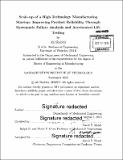| dc.contributor.advisor | David E. Hardt. | en_US |
| dc.contributor.author | Shabbir, Ali, M. Eng. Massachusetts Institute of Technology | en_US |
| dc.contributor.other | Massachusetts Institute of Technology. Department of Mechanical Engineering. | en_US |
| dc.date.accessioned | 2016-02-29T15:00:44Z | |
| dc.date.available | 2016-02-29T15:00:44Z | |
| dc.date.copyright | 2015 | en_US |
| dc.date.issued | 2015 | en_US |
| dc.identifier.uri | http://hdl.handle.net/1721.1/101334 | |
| dc.description | Thesis: M. Eng. in Manufacturing, Massachusetts Institute of Technology, Department of Mechanical Engineering, 2015. | en_US |
| dc.description | Cataloged from PDF version of thesis. | en_US |
| dc.description | Includes bibliographical references (pages 112-115). | en_US |
| dc.description.abstract | Ensuring product reliability is a key driver of success during the scale-up of a high-technology manufacturing startup. Reliability impacts the company image and its financial health, however most manufacturing startups do not have a solid understanding of their product's reliability. The purpose of this thesis is to introduce systematic failure analysis to the engineering design process and to establish a framework for testing and analyzing product life so that imperative business decisions and design improvements could be made with regards to reliability. A detailed study and implementation of these process improvements to address reliability issues was conducted at New Valence Robotics Corporation (NVBOTS) in Boston, Massachusetts. Systematic failure analysis was achieved through the creation and implementation of Failure Modes and Effects Analysis (FMEA) procedures. A single FMEA iteration was performed on the NVPro printer to identify the top risk component-linear ball bushings-for detailed life analysis. Following an in-depth investigation of potential failure modes of the linear bushings, an Accelerated Life Test (ALT) was designed using Design of Experiments (DOE) principles. An accompanying test apparatus with mechatronic control was also designed. The ALT was not actually executed but representative data was analyzed for illustrative purposes using the General Log-Linear (GLL) life-stress relationship and a 2-parameter Weibull distribution for the accelerating stresses of mechanical load and lubrication. The work performed provides NVBOTS and similar high-technology manufacturing startups a complete starting point for systematically analyzing their product's reliability and quantitatively evaluating its life in a resource efficient way. | en_US |
| dc.description.statementofresponsibility | by Ali Shabbir. | en_US |
| dc.format.extent | 115 pages | en_US |
| dc.language.iso | eng | en_US |
| dc.publisher | Massachusetts Institute of Technology | en_US |
| dc.rights | M.I.T. theses are protected by copyright. They may be viewed from this source for any purpose, but reproduction or distribution in any format is prohibited without written permission. See provided URL for inquiries about permission. | en_US |
| dc.rights.uri | http://dspace.mit.edu/handle/1721.1/7582 | en_US |
| dc.subject | Mechanical Engineering. | en_US |
| dc.title | Scale-up of a high-technology manufacturing startup : improving product reliability through systematic failure analysis and accelerated life testing | en_US |
| dc.type | Thesis | en_US |
| dc.description.degree | M. Eng. in Manufacturing | en_US |
| dc.contributor.department | Massachusetts Institute of Technology. Department of Mechanical Engineering | |
| dc.identifier.oclc | 938856068 | en_US |
